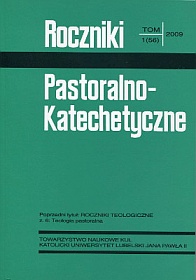Powołanie katolików świeckich
Abstrakt
Lay people who participate in the triple office of Christ and the Church realize their vocation by their presence and by being active in the world. The world and the requirements of life modify their Christian vocation in a particular way. This differs them from the clergymen. Although they share a common Christian dignity and they build the same Divine Kingdom, they do it in a way that is peculiar to them and in the domains they represent: in marital and family life, in culture, art, economy, careers, political institutions and international relations (Decree on the Apostolate of the Laity, 7). The presence of lay Catholics in these fields of human life is something particular, and their apostolic activities are necessary. By living in the world and shaping it according to God’s thought they realize their detailed vocation, which is an actual form of their Christian vocation.
Bibliografia
Dyduch J.: Kim jest wierny świecki? „Ateneum Kapłańskie” 82:1990 nr 487 s. 365-376.
Kamiński R.: Duszpasterstwo w społeczeństwie pluralistycznym. Lublin 1997.
Naves L. M.: Kilka myśli o roli laikatu według dokumentów Vaticanum II. „Znak” 36:1984 nr 351-352 s. 258-266.
Nagy S.: Świeccy w komunijnej wspólnocie Kościoła. „Ateneum Kapłańskie” 82:1990 nr 487 s. 377-387.
Pylak B.: Powołanie ludzi świeckich w świetle wypowiedzi II Soboru Watykańskiego II. „Analecta Cracoviensia” 8:1976 s. 177-188.
Weron E.: Teologia życia wewnętrznego ludzi świeckich. Warszawa 1980.
Weron E.: Czy istnieje Boże powołanie do świeckiego stanu życia. „Collectanea Theologica” 61:1991 fasc. 1 s. 126-132.
Weron E.: Laikat w nowym Katechizmie Kościoła. „Collectanea Theologica” 65:1995 fasc. 4 s. 128-137.

